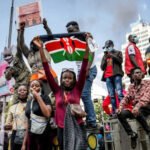Chairman of the Economic and Financial Crimes Commission (EFCC), Abdulrasheed Bawa, says the absence of a unified regulatory and supervisory framework for nonprofit organisations (NPOs) in Nigeria remains a source of worry.
The commission recently commenced a nationwide risk assessment (NRA) programme of NPOs in the country with the goal of determining the vulnerabilities of the organisations to money laundering and financing of terrorists.
Development Diaries understands that the assessment is a collaborative initiative of the EFCC through the Special Control Unit against Money Laundering (SCUML) and relevant stakeholders in the public and private sectors.
Initiated in 2013, the NRA is charged with raising primary concerns for money laundering and terrorist financing risk in the country.
Also in 2013, the EFCC signed a Memorandum of Understanding (MoU) with international funding organisations and the Global Fund to monitor how grants provided by groups will be deployed for humanitarian support in the country.
The EFCC boss said that the programme, apart from ensuring proper classification of the NPOs in Nigeria, to identify NPOs that are at risk of money laundering and financing of terrorists, will ensure improved compliance with relevant international, regional and domestic laws and regulations.
He also said that it will help in developing mitigating measures for the ‘at risk and vulnerable NPOs’ in Nigeria, while enhancing coordination and collaboration between government regulatory agencies and the civic space.
‘As you are all aware, the Financial Action Task Force continues to identify, assess, and understand the money laundering and terrorist financing risks inherent in their systems for an efficient allocation of resources to address the identified threats and vulnerabilities’, he said in Abuja.
‘The crisis in the civic space has only resulted in the proliferation of nonprofit organisations, especially in the northeast where the country is most challenged with the colossal humanitarian crisis created by the Boko Haram insurgency.
‘The continued and increasing exposure of their activities coupled with the absence of a unified comprehensive regulatory and supervisory framework for the sector in the country remains a source of concern for the authorities’.
For his part, the Executive Director of the Nigeria Network of NGOs (NNNGO), Oluseyi Oyebisi, pledged the network’s support to the programme.
He described the programme as the start of an important journey and an example for the rest of Africa on how regulators and operators can partner in fighting money laundering.
Also speaking at the commencement of the programme, the Director, International Non-Governmental Organisation Forum (INGO Forum), Chiara Crenna, expressed the willingness of the INGO in Nigeria to work with the commission towards the success of the programme.
Source: EFCC
Photo source: EFCC






